FOR BUSINESS'S AND IMMIGRANTS PLANNING TO MOVE TO BELIZE, AND HOPE TO OPERATE A WORLD WIDE BUSINESS BASED ON INTERNET AVAILABILITY, HERE IS OUR EXPERIENCE. WE LOSE THE SIGNAL BY WIRELESS OFTEN. THE SERVICE CAN BE VERY SLOW AND INTERMITTENT. YESTERDAY, IT TOOK 1.5 HOURS TO DOWNLOAD AN ADVERTISED 5 MINUTE ONLINE VIDEO LESSON.
OUR BUSINESS IS "JAGUAR CAPITAL MANAGEMENT", A FAMILY OPERATED PRIVATE HEDGE FUND, AND WE WORK ONLINE WITH OUR BROKERS IN CHICAGO MANY HOURS A DAY, FROM BELIZE AND ANYWHERE WE MIGHT TRAVEL. WE HAD GOOD SERVICE FROM LOCAL BTL ON CAYE CAULKER, BUT IN THE WEST, Hillview, Santa Elena Town, the shared internet availability is said to be oversubscribed. Plus there are not enough relay antenna's to serve people in the many valleys of the FOOTHILLS, OF THE PICTURESQUE, BELIZE ALPS.
Snapshot: Internet speeds and pricing update 2012
This
is a 2012 update of Internet speeds and pricing across the
English-speaking Caribbean, and the extent to which they have changed
over the last year.
For those who have ready access to the Internet, have you ever considered what life might be like if you no longer had it? For many of us, key aspects of our private and professional lives would effectively grind to a halt, which inherently demonstrates the growing importance of Internet service within the Caribbean.
In May 2011, we provided a snapshot of Internet speeds and pricing across the English-speaking Caribbean, and provided a six-month update last November . In this post and one year later, we are updating our findings, and discussing the changes that have occurred since May 2011.
The offerings from the ISPs varied drastically in respect of transmission speeds, hence the exercise was limited to identifying (per country):
Finally, it is emphasised that the review focused on the monthly rates payable for specified Internet plans only. The exercise excluded initial subscription and activation fees, as well as any additional monthly charges that might be applicable. The rates were converted to United States Dollars (USD) when required, based on going commercial exchange rates. Applicable taxes have also been included.
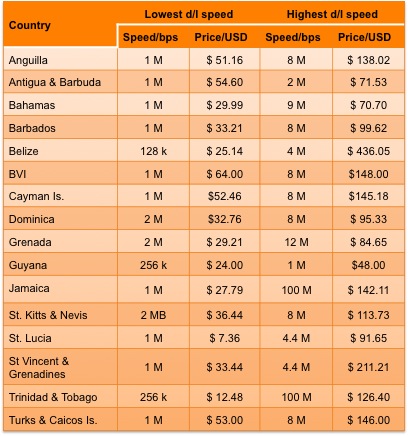 With regard to the best price for a broadband Internet plan with an
advertised download speed of 2 Mbps, and with the exception of Belize
and Guyana, the monthly subscription is under USD 100.00, as shown in
Figure 1. In Belize and Guyana, the best rates appear to be USD 256.50
and USD 6,895.00 respectively, which are likely to be outside the
average citizen’s budget for telecoms service. On the other hand, the
lowest advertised price is USD 29.21 in Grenada, whilst the highest is
USD 84.00 in the British Virgin Islands. The average price across the
region for a 2 Mbps Internet plan, excluding Guyana only, is USD 65.37.
With regard to the best price for a broadband Internet plan with an
advertised download speed of 2 Mbps, and with the exception of Belize
and Guyana, the monthly subscription is under USD 100.00, as shown in
Figure 1. In Belize and Guyana, the best rates appear to be USD 256.50
and USD 6,895.00 respectively, which are likely to be outside the
average citizen’s budget for telecoms service. On the other hand, the
lowest advertised price is USD 29.21 in Grenada, whilst the highest is
USD 84.00 in the British Virgin Islands. The average price across the
region for a 2 Mbps Internet plan, excluding Guyana only, is USD 65.37.
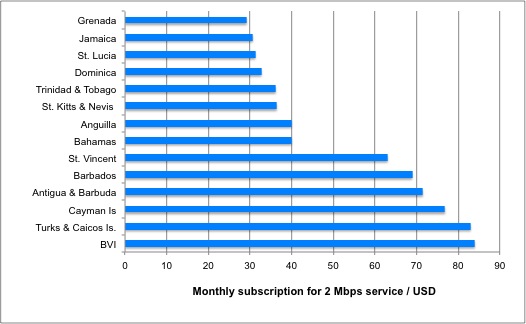 If instead a customer is prepared to pay around USD 60.00 per month
for Internet services, the best value for money would be found in
Jamaica, where a plan with an advertised download speed of 20 Mbps would
cost approximately USD 46.53 (inclusive of GCT at 17.5%, as shown in
Figure 2. At the other end of the scale, Belize offers a 256 kbps plan
for USD 51.30, and Anguilla offers a 1 Mbps plan at USD 51.16. It is
also highlighted that in the British Virgin Islands, there does not
appear to be any Internet service plan for under USD 60.00.
If instead a customer is prepared to pay around USD 60.00 per month
for Internet services, the best value for money would be found in
Jamaica, where a plan with an advertised download speed of 20 Mbps would
cost approximately USD 46.53 (inclusive of GCT at 17.5%, as shown in
Figure 2. At the other end of the scale, Belize offers a 256 kbps plan
for USD 51.30, and Anguilla offers a 1 Mbps plan at USD 51.16. It is
also highlighted that in the British Virgin Islands, there does not
appear to be any Internet service plan for under USD 60.00.
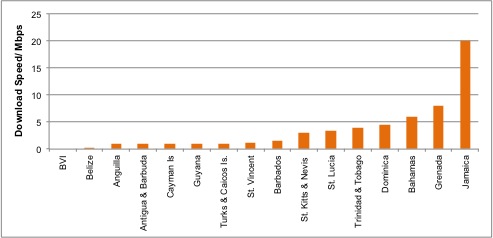
Since May 2011, pricing changes have occurred in Barbados, Anguilla, Saint Lucia and Dominica. As shown in Figure 3, for a 2 Mbps plan, the change in monthly rates between May 2011 and May 2012, ranged from an increase of USD 1.47 in Barbados, to a decrease of USD 29.44 in Dominica.
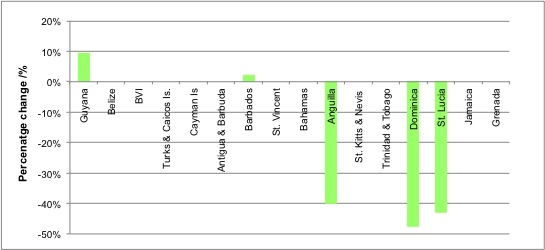 The above rate changes have also had an impact on the average monthly
pricing across the region for a 2 Mbps plan. In May 2011, the average
monthly rate was USD 57.30, excluding both Belize and Guyana, whilst by
May 2012, that figure had decreased by around 10% to USD 51.71.
The above rate changes have also had an impact on the average monthly
pricing across the region for a 2 Mbps plan. In May 2011, the average
monthly rate was USD 57.30, excluding both Belize and Guyana, whilst by
May 2012, that figure had decreased by around 10% to USD 51.71.
In summary and through our three Snapshots of Internet speed and rates, we can begin to see, to varying degrees, Internet speeds, and/or the monthly pricing changing across the region. In the coming year, higher speed packages should become available, consistent with demand, which is also reflected in, among other things, the widespread proposals to roll out 4G mobile and/or broadband services within this calendar year.
The increasing focus on 4G mobile and/or (wireless) broadband services, means that there is growing pressure on the more traditional ISPs, and even Subscriber TV providers that offer Internet service, to raise their game and imporve their offerings. Hence in more competitive markets, you are likely to find a greater effort being made to increase network build out, and to offer either lower rates or better value for money.
____________
Related posts:
For those who have ready access to the Internet, have you ever considered what life might be like if you no longer had it? For many of us, key aspects of our private and professional lives would effectively grind to a halt, which inherently demonstrates the growing importance of Internet service within the Caribbean.
In May 2011, we provided a snapshot of Internet speeds and pricing across the English-speaking Caribbean, and provided a six-month update last November . In this post and one year later, we are updating our findings, and discussing the changes that have occurred since May 2011.
Approach
Data for this review was collected from the websites of widely used Internet Service Providers (ISPs) in the countries covered. To the extent possible, at least two ISPs were examined in each country (Table 1), and the exercise was limited to non-dialup Internet services and to service plans targeted at domestic/residential customers.The offerings from the ISPs varied drastically in respect of transmission speeds, hence the exercise was limited to identifying (per country):
- the lowest advertised download speed and the corresponding monthly rate
- the highest advertised download speed and the corresponding monthly rate
- the monthly rate for a 2 Mbps service plan, and
- the highest download speed plan that can be purchased for no more than USD 60.00 per month.
Finally, it is emphasised that the review focused on the monthly rates payable for specified Internet plans only. The exercise excluded initial subscription and activation fees, as well as any additional monthly charges that might be applicable. The rates were converted to United States Dollars (USD) when required, based on going commercial exchange rates. Applicable taxes have also been included.
What are the May 2012 results?
As reflected in Table 2 below, the minimum download speeds offered in most countries is still 1 Mbps, with the exception of Belize, Guyana and Trinidad & Tobago, where Internet packages with download speeds as low as 128 kbps are still available. Almost 70% of the group offers broadband packages with a maximum advertised download speed of 8 Mbps and up. However, it is only in Jamaica and Trinidad and Tobago that customers can purchase Internet plans with advertised download speeds of up to 100 Mbps, and the next highest package is 12 Mbps in Grenada.
Table 2: Best monthly pricing in US Dollars for select Internet plans based on advertised download speed (Source: ISP websites)

Figure
1: Best monthly rates payable for an Internet plan with an advertised
download speed of 2 Mbps in select Caribbean countries as at May 2012
(Source: ISP websites)

Figure
2: Best Internet plan by advertised download speed for up to USD 60.00
in select Caribbean countries as at May 2012 (Source: ISP websites)
How do these results compare with our earlier snapshots?
Since May 2011 Internet spend snapshot, there have been a few noticeable changes in Internet pricing across the region. The most drastic changes occurred in Belize, where new plans were added, specifically 2 and 4 Mbps packages, and monthly rates were reduced. Additionally, over the last year, we have been able to secure information on service plans and rates offered by other ISPs that might not have been publicly available over the Internet when our Snapshot series commenced, but which would provide a clearer picture of the options available in the region.Since May 2011, pricing changes have occurred in Barbados, Anguilla, Saint Lucia and Dominica. As shown in Figure 3, for a 2 Mbps plan, the change in monthly rates between May 2011 and May 2012, ranged from an increase of USD 1.47 in Barbados, to a decrease of USD 29.44 in Dominica.

Figure
3: Percentage change in the monthly rates for a 2 Mbps plan between May
2011 and May 2012 in select Caribbean countries (Source ICT Pulse)
In summary and through our three Snapshots of Internet speed and rates, we can begin to see, to varying degrees, Internet speeds, and/or the monthly pricing changing across the region. In the coming year, higher speed packages should become available, consistent with demand, which is also reflected in, among other things, the widespread proposals to roll out 4G mobile and/or broadband services within this calendar year.
The increasing focus on 4G mobile and/or (wireless) broadband services, means that there is growing pressure on the more traditional ISPs, and even Subscriber TV providers that offer Internet service, to raise their game and imporve their offerings. Hence in more competitive markets, you are likely to find a greater effort being made to increase network build out, and to offer either lower rates or better value for money.
____________

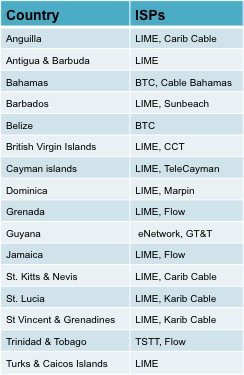



1 comment:
I made $20 for each 20 minute survey!
Guess what? This is exactly what big companies are paying for. They need to know what their average customer needs and wants. So big companies pay millions of dollars per month to the average person. In return, the average person, like me, participates in surveys and gives them their opinion.
Post a Comment